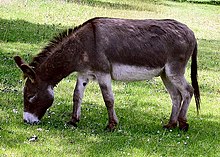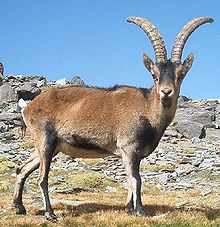Ungulate
| Ungulata Temporal range: Possible Upper Cretaceous–Present
| |
|---|---|

| |
| Donkey, Equus africanus | |

| |
| Spanish ibex (Capra pyrenaica) | |
| Scientific classification | |
| Domain: | Eukaryota |
| Kingdom: | Animalia |
| Phylum: | Chordata |
| Class: | Mammalia |
| Grandorder: | Ferungulata |
| (unranked): | Ungulata Linnaeus, 1766 |
| Orders and Clades | |
| |
Ungulates (meaning roughly "hoofed animal") are several groups of mammals. Most of them use the tips of their toes, usually as hooves, to support their body weight while moving.
As a descriptive term, "ungulate" normally excludes cetaceans (whales, dolphins, porpoises), because they do not have most of the typical morphological characteristics of ungulates. However, recent discoveries show that the Cetacea were descended from early artiodactyls.[3]
Ungulates are typically herbivorous and many use specialised gut flora to digest cellulose. Some modern species, such as pigs, are omnivorous. Some prehistoric species, such as the Mesonychia, were carnivorous.
Ungulates include odd-toed ungulates such as horses, rhinoceroses and tapirs, and even-toed ungulates such as cattle, pigs, giraffes, camels, sheep, deer, and hippopotamuses. Cetaceans are also even-toed ungulates although they do not have hooves.
References
[change | change source]- ↑ Welker, F. (2015). "Ancient proteins resolve the evolutionary history of Darwin's South American ungulates" (PDF). Nature. 522 (7554): 81–84. Bibcode:2015Natur.522...81W. doi:10.1038/nature14249. PMID 25799987. S2CID 4467386.
- ↑ Burger, Benjamin J. 2015. The systematic position of the sabre-toothed and horned giants of the eocene: the Uintatheres (order Dinocerata). Utah State University, Uintah Basin Campus, Vernal, UT, USA 84078, SVP 2015.
- ↑ Ursing B.M.; Arnason U. (1998). "Analyses of mitochondrial genomes strongly support a hippopotamus-whale clade". Proceedings of the Royal Society B. 265 (1412): 2251–5. doi:10.1098/rspb.1998.0567. PMC 1689531. PMID 9881471.
Related pages
[change | change source]
